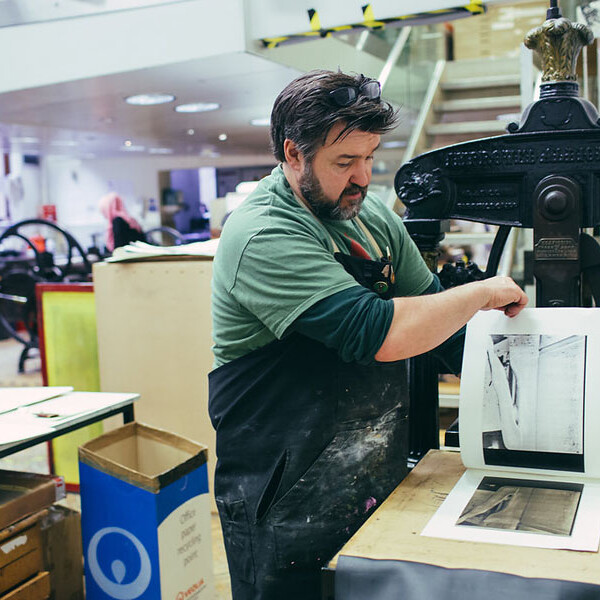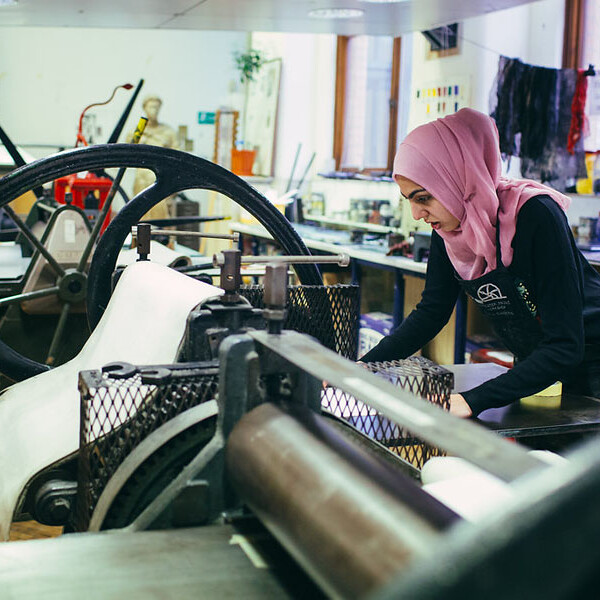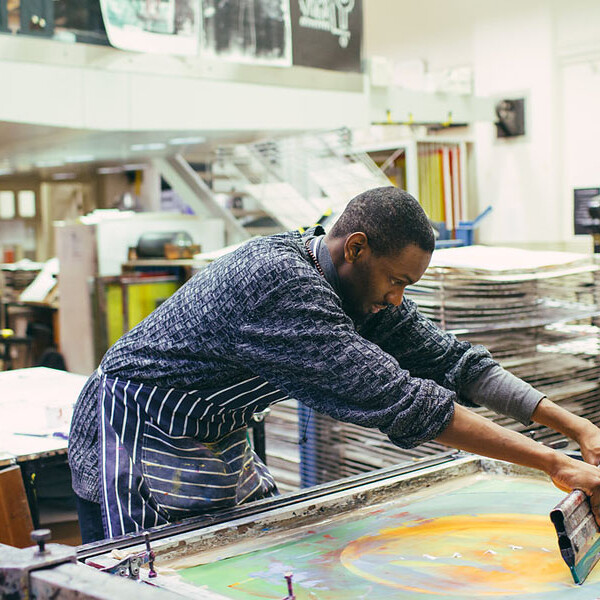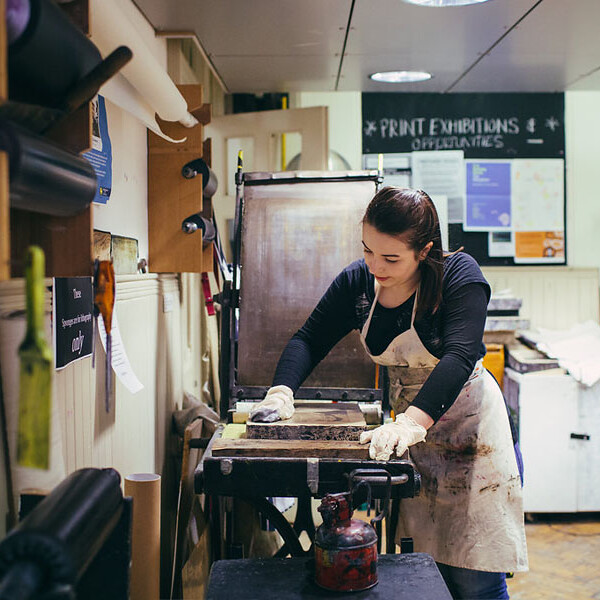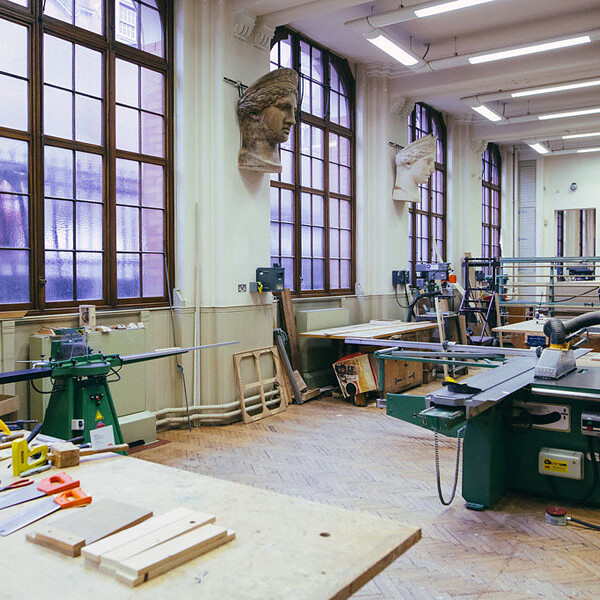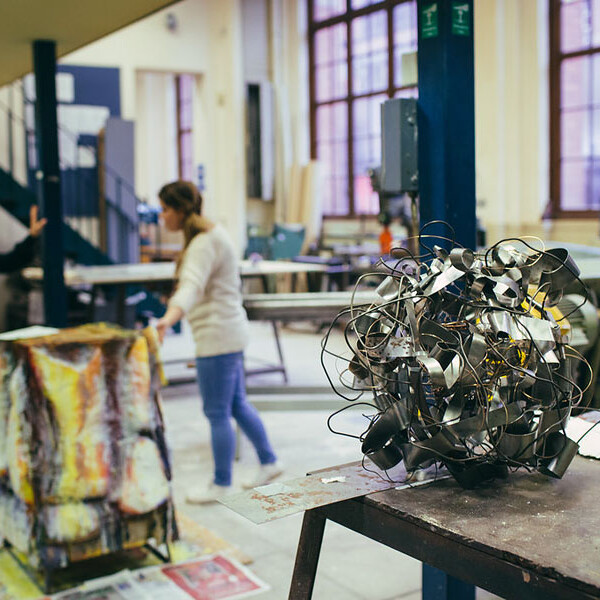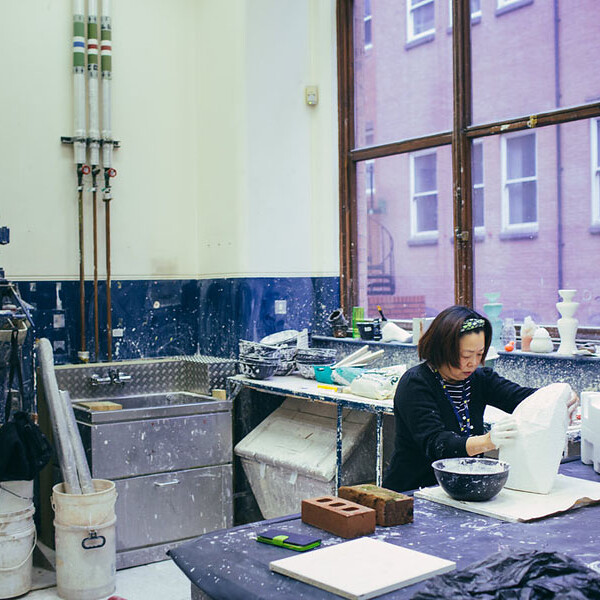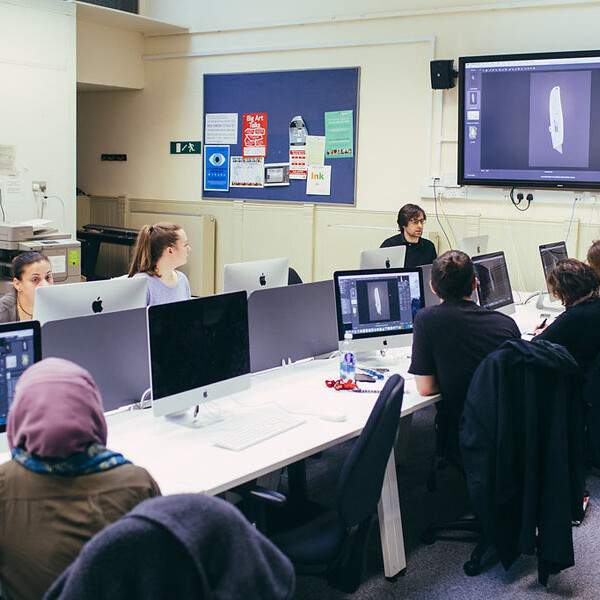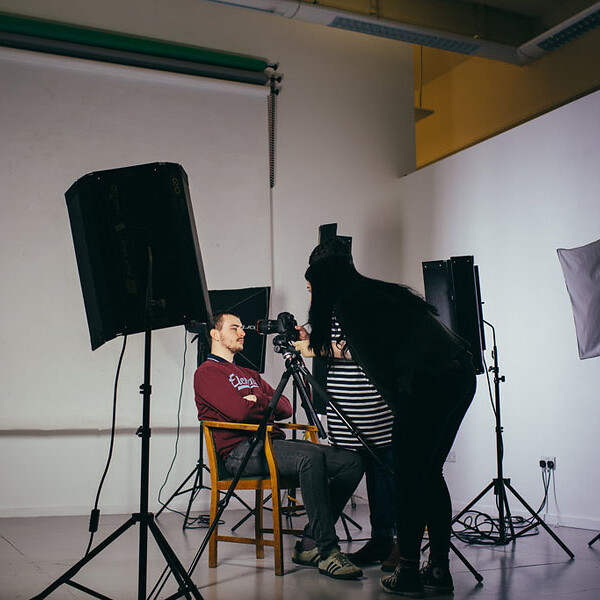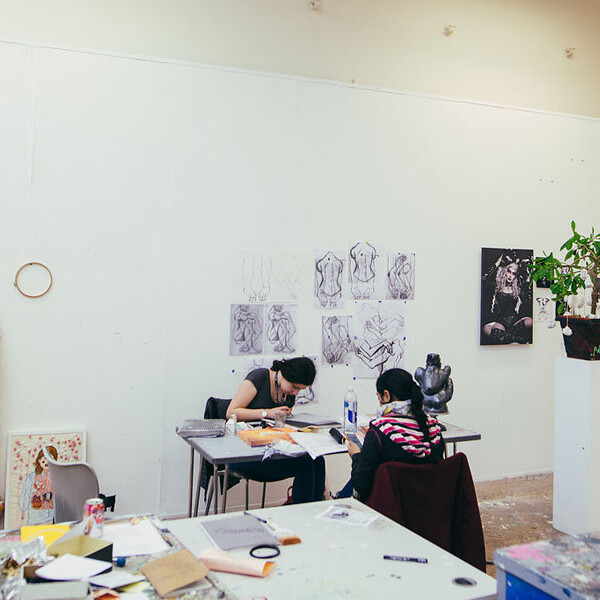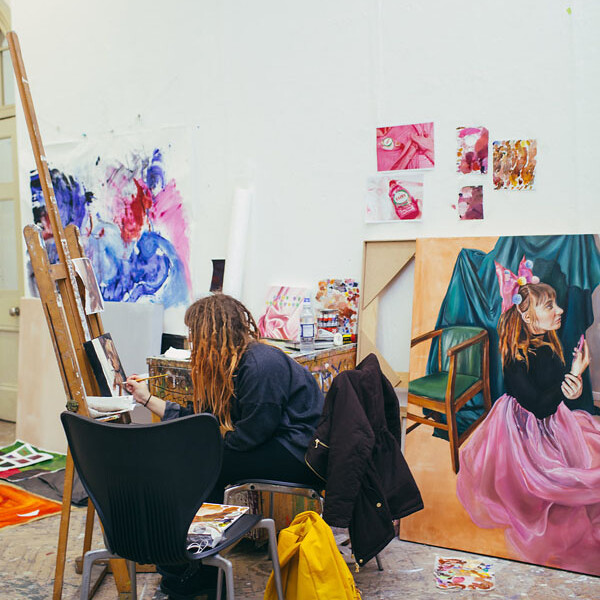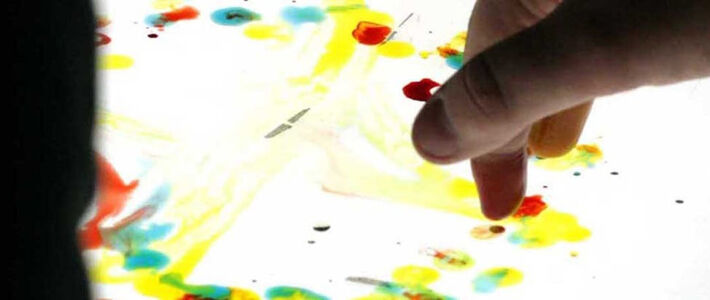
Art and Design with a Foundation Year - BA (Hons)
Currently viewing course to start in 2025/26 Entry.
September 2025 — UCAS code W19F
Maker? Thinker? Futurist? Coder? Performer? Technologist? Conservationist? Designer? Interested? Foundation Year This four-year Art and Design degree course with a Foundation Year has been specifically designed to allow you to undertake an additional year of study which will build stronger creative footings to ensure successful progression through your chosen degree course....
48 points required
Calculate UCAS pointsClearing places available
- Level Foundation
- Study mode Full Time
- Award BA (Hons)
- Start date September 2025
- Fees View course fees
- Subject
- Location Margaret Street
This course is:
Open to International Students
Overview
This course offers a Creative Technologies pathway
This optional pathway will give you the opportunity to focus specifically on developing your digital skills. You can choose this pathway at the start of your studies, or transfer over to the pathway at the end of each academic year. Read more about the Creative Technologies pathway
Clearing 2025
48 points (or equivalent) is the minimum you will need to be considered for this course in Clearing.
Use the UCAS Tariff Calculator to work out your points.
0:01
[Music]
0:04
so originally when I signed up for the
0:06
course I was looking to do graphic
0:08
design afterwards but throughout the
0:09
course we are encouraged to sort of
0:11
experiment and try different things and
0:14
do things that are out of our comfort
0:15
zone and because of that I actually then
0:18
decided to go into fine art cuz that was
0:20
a kind of for me that was a course that
0:22
I could continue doing that sort of
0:24
experimental nature that was really
0:26
great in the foundation
0:28
in the foundation i was hoping to do a
0:30
bit of digital graphic stuff so I
0:32
thought maybe I'll explore a bit of that
0:35
and see if I like it and so that was my
0:37
main thing I wanted to explore my
0:40
interest is in painting and print making
0:42
that's what I am focusing on and I like
0:46
painting because I feel like just a lot
0:48
of very gestural
0:49
work i really enjoyed studying the
0:52
different modules because they were very
0:54
different so we started off with doing a
0:56
very experimental and broad module and
0:58
then we kind of found our way into doing
1:01
a more self-directed project and during
1:04
foundation year we there were also um
1:07
life drawing workshops held which I
1:09
really enjoyed so I've explored some
1:12
physical media working in the woodwork
1:14
section mostly and also doing some
1:16
sculpting work such as this behind me
1:19
and working with all sorts of different
1:21
technicians from the audio visual to as
1:23
I say woodwork and metal work and even
1:24
some sculpting as well i found exciting
1:27
was when we had different artists come
1:29
in especially um from different areas we
1:32
had fine arts coming graphic designers
1:34
coming and talking about their work and
1:36
we had little workshops on each thing
1:38
and that was quite exciting to get
1:40
insight what would be more like focusing
1:42
on each area one of the bits that I
1:45
thought was really great with the
1:46
foundation course was I think as I
1:48
started going in I may have had like
1:49
sort of a preconceived idea of like what
1:51
an art degree would be like with
1:53
foundation art but what I discovered
1:56
from doing this was that it can be it's
2:00
so broad and it can be sort of anything
2:02
I want it to be and with the course and
2:05
the the broadness of it I could you can
2:07
incorporate all of those things and you
2:09
can incorporate your interests and make
2:13
something out of that which I found
2:14
really exciting so the highlight of the
2:18
year has to be part of the shows where
2:20
I'll be showing off stuff like this but
2:22
also night school where you get to tap
2:24
in to see what other students are doing
2:26
and what workshops they're providing cuz
2:28
sometimes you get to join in and see
2:30
what they're doing and maybe get some
2:31
inspiration for building something
2:32
yourself so I've got a couple of
2:35
highlights and one would be the staff
2:37
staff was really supportive and
2:38
obviously coming into university and
2:40
never having met anyone they were just
2:42
the most welcoming and they made quite a
2:45
huge experience to it the highlight of
2:47
the year was the big show at the end i
2:50
think it from the very start how it all
2:52
came to the end it was mind-blowing and
2:54
I believe it was one of my best works
2:56
that I've did i'm very happy with it and
2:58
that was yeah amazing for me it was a
3:00
really proud moment that I could look
3:02
back at this culmination of all the work
3:05
that I'd done in the year and think
3:06
about to where I was at the beginning of
3:08
the foundation year and everything I'd
3:10
learned and to kind of see it i felt
3:13
like I think it was the first moment I
3:15
went "Yeah I am an artist." Like it's
3:17
all the things that I'd learned
3:20
[Music]
Maker? Thinker? Futurist? Coder? Performer? Technologist? Conservationist? Designer? Interested?
Foundation Year
This four-year Art and Design degree course with a Foundation Year has been specifically designed to allow you to undertake an additional year of study which will build stronger creative footings to ensure successful progression through your chosen degree course.
Working in a lively and energetic environment, you will be given the freedom to expand your knowledge of practical skills, creative exploration and conceptual development, underpinned by broad critical understanding, academic writing and emerging theoretical principles.
There will be a range of opportunities to work on collaborative projects aimed to develop employability partnerships and to identify the role of developing practitioner. BA teaching staff from within the Birmingham Institute of Creative Arts (BICA) will work closely with you throughout the foundation year to prepare you for progression.
After successful completion of your foundation year, you will have the flexibility to switch (should you wish to change direction) onto a number of related undergraduate degree programmes within the Birmingham Institute of Creative Arts.
BA (Hons) Art and Design
Many innovative creative studios now define themselves as interdisciplinary, a word which we define as the fluid movement across the fields of art, design and technology. Rather than specialising in a particular creative discipline, our cutting-edge course reflects how these studios practice by exploring the intersection between art and design, with the implementation of new creative digital technologies.
What's covered in this course?
Our course will prepare you to be ready for employment within the creative industries by providing you with long-term creative skills to map out your creative future. With you at the centre, we will explore the intersections of art and design, providing a space where you can understand, develop and create a career in the evolving creative industries. You will develop the necessary self-awareness to question, make, play and create with others.
The versatility of our experimental studio environment will enable you to explore the necessary collisions that innovative ideas creation now requires, while enhancing a range of core skills including design thinking, creative problem-solving, collaboration, communication, and making.
Whether you choose to combine creative coding with foraging for natural materials, photography with artificial intelligence, or welding with audio performance, you will respond to live briefs set by real-life clients.
The flexible, student-centred approach to the curriculum, informed by professional practitioners, will enable you to be imaginative, confident and convincing in designing and shaping your role in tomorrow’s free flowing, boundary free creative industries.
Creative Technologies Pathway
All students will be introduced to the fundamentals of interdisciplinary art and design practice with a focus on new creative technologies, which forms the core ethos of this course. In line with the development of our digital futures we are introducing an optional pathway in Creative Technologies which will give you the opportunity to focus specifically on further developing your digital skills through a breadth of technological approaches.
If you choose the Creative Technologies pathway you will cover the same curriculum, but will opt for technology-based outcomes. You will be assessed in relation to your exploration, questioning and use of a range of contemporary digital technologies and your creative applications in relation to the module theme. Work may still embrace a sense of physicality, but the focus will retain an element of Creative Technologies. You can either choose the Creative Technologies pathway at the start of your studies, or transfer over to the Creative Technologies pathway at the end of each academic year. At the end of each year, during feedback with tutors, you can transfer over to the Creative Technologies pathway, but you will be required to evidence 80% engagement with the weekly Creative Technologies workshops, which you will document on a digital platform ‘Workshop Log’. If you have not engaged in workshops to 80%, you will need to evidence sufficient engagement over the summer.
I fully support the approach to cross-disciplinary teaching, using art, design and digital technology to explore design methodologies. There is a strong emphasis on collaboration, experience and preparing students for future employability – I think this is extremely important.
Jason Bruges, Founder of Jason Bruges Studio.
Why Choose Us?
- Our cutting-edge course is future focused, and has been designed in collaboration with leading industry partners.
- Creative Technologies are one of the leading future jobs markets.
- You will work on live briefs set by real life clients, and in your second year you will have the opportunity to choose to do a work placement, or study abroad.
- Our innovative programme combines in one BA course the leading-edge teaching and learning that is available across BICA, taught by interdisciplinary staff from across BICA.
- We are celebrating 130 years of art at Margaret Street – its Grade I-listed building, located in the heart of the Colmore Business District, and in close proximity to the city’s cultural institutions and creative hubs, e.g. Ikon gallery, Birmingham Museum and Art Gallery, Barber Institute and the Jewellery Quarter.
Similar Courses
- Art and Design - BA (Hons)
- Art and Design with Creative Technologies with a Foundation Year - BA (Hons)
- Fine Art with a Foundation Year - BA (Hons)
- Graphic Design with a Foundation Year - BA (Hons)
- Photography with a Foundation Year - BA (Hons)
- Illustration with a Foundation Year - BA (Hons)
- Design for Performance: Theatre, Film and Live Events with a Foundation Year - BA (Hons)
Open Days
Join us for an Open Day where you'll be able to learn about this course in detail, chat to students, explore our campus and tour accommodation.
Next Open Day: 4 October 2025
Entry Requirements
These entry requirements apply for entry in 2025/26.
All required qualifications/grades must have been achieved and evidenced at the earliest opportunity after accepting an offer to help confirm admission and allow for on-time enrolment. This can also include other requirements, like a fee status form and relevant documents. Applicants can track their application and outstanding information requests through their BCU mySRS account.
48 points (or equivalent) is the minimum you will need to be considered for this course in Clearing.
Use the UCAS Tariff Calculator to work out your points.
Essential requirements
80 UCAS Tariff points. Learn more about UCAS Tariff points.
If you have a qualification that is not listed, please contact us.
Fees & How to Apply
UK students
Annual and modular tuition fees shown are applicable to the first year of study. The University reserves the right to increase fees for subsequent years of study in line with increases in inflation (capped at 5%) or to reflect changes in Government funding policies or changes agreed by Parliament. View fees for continuing students.
Award: BA (Hons)
Starting: Sep 2025
Pathway: Art and Design
- Mode
- Duration
- Fees
- Full Time
- 4 years
- £9,535 in 2025/26
- Apply via Clearing
Award: BA (Hons)
Starting: Sep 2025
Pathway: Creative Technologies
- Mode
- Duration
- Fees
- Full Time
- 4 years
- £9,535 in 2025/26
- Apply via Clearing
International students
Annual and modular tuition fees shown are applicable to the first year of study. The University reserves the right to increase fees for subsequent years of study in line with increases in inflation (capped at 5%) or to reflect changes in Government funding policies or changes agreed by Parliament. View fees for continuing students.
Award: BA (Hons)
Starting: Sep 2025
Pathway: Art and Design
- Mode
- Duration
- Fees
- Full Time
- 4 years
- £17,690 in 2025/26
Award: BA (Hons)
Starting: Sep 2025
Pathway: Creative Technologies
- Mode
- Duration
- Fees
- Full Time
- 4 years
- £17,690 in 2025/26
Places available to start in September
If you'd like to start this course full-time this September, you can apply through Clearing.
International and part-time students can apply online as normal using the links above.
Want to start in September 2026? You can apply via UCAS from September 2025.
You are not required to submit a portfolio for this course.
Course in Depth
Foundation Year
Throughout the year you will be challenged with projects that question your current creative experiences and explore a breadth of experimentation to broaden your technical and critical understanding.
You will be encouraged to analyse methods and materials appropriate for creative development and to question your position in relation to historical, contemporary and future world scenarios. Both practical and written research tasks will be supported by one to one tutorials and small discussion groups to help you constructively build academic and social confidence.
The two first semester modules will form the building blocks for future work and will explore core principles of creative practice focussing on, the development of technical confidence, research, study skills and productivity.
The two final semester modules will give you greater autonomy, encourage positive integration between research and practice, challenging decision making and technical competency. This semester is designed to empower you with independent learning skills appropriate for your future BA studies.
In order to progress onto your BA Programme, you must successfully pass all four core modules (totalling 120 credits).
This module explores the term ‘practice’ as the process of making, developing and recording information. We will work with you to explore the development of your work based on a set project, looking at a number of documentation strategies while experimenting with a broad range of materials. You will have the opportunity to meet artists and practitioners through local gallery visits and in studio activities and will learn to analyse your work through tutorials and small group discussions.
Artists work in a globally influenced, culturally diverse, and technologically advancing world.
Their art is a dynamic combination of materials, methods, concepts, and subjects that challenge traditional boundaries and defy easy definition.
This module will look at experimental approaches to drawing to identify radical new solutions from the perspective of the contemporary world we live in.
During this module you will meet lecturers, researchers and partners from across BCU, the city and further afield to open your understanding of practiced based creative work.
Through lectures and workshops, you will be introduced to the versatility of subject areas in terms of ideas, development, research, materials, techniques and contexts.
Figuring out how the universe works might be a bit more than we need to do each day but paying attention to the future of the world we live in, is worth exploring.
Creative realisation is not just about the practice of producing creative responses, it is about identifying the factors that generate creative thinking and facilitating the process.
For this module you will draw on your own creative strategies to facilitate the development of a project that is appropriate for progression onto your chosen BA (Hons) course.
To identify the focus for your project you must research ‘Future Horizons’ from the rapidly changing world around you - anything that reflects new innovations, e.g. seismic changes, space travel, war, social conflict, internationalisation, environment, technology, architecture, bio-art etc. – whether great or small.
Undergraduate Staff will offer guidance on developing a constructive portfolio that affirms your potential for a rewarding creative future.
First Year
In order to complete this course you must successfully complete all the following CORE modules (totalling 120 credits)
This module introduces critical thinking and building self-awareness to create a community. Through group discussions and debate you will be supported to develop learning strategies. You will be introduced to creative design thinking, verbal and visual communication tools, and core writing skills. You will look at a body of thoughts from across the world, capturing a global, diverse range of voices.
This module explores the connectivity of materials, and how materials collaborate with each other. You will collaboratively test, experiment and prototype, by exploring: fusion; confusions; knotting; welding; embedding; joints; and breaking things. You will look at a body of materials and their applications from across the world, capturing a global, diverse range of voices.
This module explores the fundamentals of, and interconnective relationship between, different contemporary creative digital technologies. You will collaboratively experiment, test and embrace digital technologies, by exploring: coding; digital modelling; digital drawing; projection; filming; editing; VR/AR; sound; and, light. You will look at a body of technologies and their applications from across the world, capturing a global, diverse range of voices.
This module focuses on narrative, the different ways narratives can be created, and the possible exploration of: movement; performance (of materials or a person); presentation; spoken word; animation; costume; or set. You will look at a body of performance from across the world, capturing a global, diverse range of voices.
This module focuses on making, using found materials in the natural environment. The module will explore a range of possible themes, including: natural materials; foraging; growing; building; stone carving; nesting; thatching; collecting; or observing. You will look at natural materials and their application across the world, capturing a global, diverse range of voices.
This module is a round-up of the year, revisiting and building on what has been done to date. You and your peers will self-organise to look out to the wider community of Birmingham and collaboratively identify, develop and design speculative proposals. The module, and the year, will culminate with an outward-facing exhibition.
Second Year
In order to complete this course you must successfully complete all the following CORE modules (totalling 100 credits)
This module provides an opportunity for you to apply your knowledge and skills to an external, professional brief. The brief will be set by a local external client, user, community or audience, in consultation with the staff team, and it could be a ‘real life’ problem to be solved, or a simulation. It is an opportunity for you to engage in a professional manner, within the supportive infrastructure of the University. Where appropriate, the project may involve interdisciplinary collaboration with students from other courses. In this way, it reflects the collaborative, flexible nature of employment within the creative industries.
This module explores real-world challenge-based learning, through a nationally located live brief, set by an external client, partner, user, community or audience. The module will have an employability focus, an emphasis on building professional communication skills, and you will expand your knowledge of interdisciplinary design practice across the creative industries.
This module focuses on real-world challenge-based learning, through a globally located live brief, set by an external client, partner user, community, audience or institution. Building on the skills developed in the previous modules throughout year two, this module has a global perspective, and an emphasis on Global Citizenship, understanding different cultures, knowledge and working practices.
In order to complete this course you must successfully complete at least 20 credits from the following list of OPTIONAL modules:
This module is an opportunity to learn and critically reflect on the skills of collaboration by enabling you to create an interdisciplinary project with students from complementary disciplines, or with academic staff. Collaboration is a vital employability skill within the creative industries and this module allows you to develop these skills, making use of University facilities and with the support of academic staff.
The purpose of this module is to enable you to develop professional attributes and subject skills through experience in the work place, and to critically reflect upon your learning in that context. You will normally be expected to arrange your own placement, with support from academic staff and ADM Careers+. Typically, the placement duration is a minimum 70 hours, maximum of 140 hours. This can be achieved in one block, or can be dispersed over a longer period of time, if required. If you fail to secure a placement by the specified deadline, an “as live” industry standard project will be set by the module tutor. The work placement will be considered and approved by the module tutor in order to ensure that the learning opportunity is of benefit to you.
Core modules are guaranteed to run. Optional modules will vary from year to year and the published list is indicative only.
Final Year
In order to complete this course you must successfully complete all the following CORE modules (totalling 60 credits)
The purpose of this module is to enable you to undertake a sustained, in-depth and theoretically informed research project exploring an area that is of personal interest to you. You will be guided towards choosing a research topic, which is relevant to your discipline and in which your lecturers have expertise.
In this module you will investigate the wider creative industries, locally, nationally and globally, to better understand what your potential future pathway might look like. In response to a series of supporting lectures from a range of industry experts, you will develop your professional identity by constructing a range of appropriate self-promotional materials.
Plus one of the following CORE modules (totalling 60 credits):
This module is tailored to your individual strengths, research areas and career aspirations. You will follow your own pathway to make a body of work, navigating your way through the Thought Lab, Materials Lab and Digital Lab. This could be achieved individually, or in collaboration with others, using an external live brief or a speculative brief.
This module is tailored to your individual strengths, research areas and career aspirations. You will follow your own pathway to make a body of work, navigating your way through the Thought Lab, Materials Lab and Digital Lab. This could be achieved individually, or in collaboration with others, using an external live brief or a speculative brief.
This course focuses on rapid learning and experimentation, and you will engage in real-world challenges. The course will enable you to question, explore, experiment, make, play and create with others.
Foundation Year
Working in a lively and energetic environment you will be given the freedom to expand your knowledge in conceptual development, practical skills and creative exploration underpinned by broad critical understanding and emerging theoretical principles.
You will work individually and collaboratively to develop a stimulating visual portfolio of work that evidences your enthusiasm for further study within a specific subject area.
BA teaching staff will work with you throughout the course and you will have full access to all of the University facilities.
Year One
Level 4 takes you and your peers from ‘I to Us’ to harness your self-awareness as part of how you learn and collaborate with others in your teams. You will navigate through ‘Labs’ that represent the fundamentals of interdisciplinary design process (defined as ‘between’ or ‘among’ defined disciplines). The term ‘Lab’ is used to communicate that the studio environment will be a place of experimentation. We define Lab as ‘a creative environment that encourages experimentation, play, risk-taking and making a mess.’
The three primary Labs are: Thought Lab; Materials Lab; and Digital Lab. You will iteratively move through these Labs in the first semester. Additional Labs will be introduced once the fundamentals of the interdisciplinary design process have been established. These new Labs are: Nature Lab; Performance Lab; and, Speculative Lab. What will connect them all is a sense of community and communal sharing. Throughout the module you and your peers will regularly bring your work together to share, display, discuss, and critique.
Throughout the course you will be asked to ‘creatively interrogate’ by examining, questioning, and then making a response to a given source, theme or object. These challenges are designed to expose you to new approaches to ‘sense making’ while considering different perspectives and different voices.
Year Two
Level 5 uses the emergent process developed in Level 4 to move you and your peers from ‘Us to We’, from working with each other to working as a unit with external clients. You will focus on real-world challenge-based learning, through live briefs that are locally, nationally and globally located, set by an external client, user, community or audience. Building on skills developed in the previous module, the scope is now bigger, with broader perspectives, an employability focus, and an emphasis on building professional communication skills. You will collaboratively question and explore a live brief, while iteratively moving through the Thought, Materials and Digital Labs as needed as your projects grow and develop.
Year Three
Level 6 encourages you to diverge to follow your own pathway, navigating your own way through the Labs. You may focus on one Lab, or a combination of Labs, or create new Labs of your own. You may choose to work individually or collaboratively. You will undertake a sustained, in-depth and theoretically informed research project exploring an area of personal interest, and you will create a body of work. You will also integrate professional companies and the creative landscape to identify a future career path and develop a professional identity.
Trips and visits
You may have the opportunity to participate in exchanges, placement, external projects and go on national and international study visits.
In previous years international trips have included visiting the Venice Biennale, New York, Berlin and Barcelona. National trips have included visits to London, Liverpool and Bristol.
Download course specification
BA (Hons) Art and Design with a Foundation Year
BA (Hons) Art and Design with Creative Technologies with a Foundation Year
Employability
Enhancing employability skills
Our course seeks to respond to the rapidly evolving creative industries, to enable you to not only be ready for immediate employment, but also for future evolutions within the industries, by providing you with long-term skills and employability. Informed by professional practitioners and researchers, the course reflects pioneering practices that cross art, design, and creative technologies. The course will enable you to be imaginative, confident and convincing in taking up and even designing and shaping your future role as a creative leader and practitioner of change.
The course offers strong employability potential for students as the Digital Creative sector is the largest growth sector of the creative industries. All skills and capabilities developed on the course are highly transferable and will support you to develop a range of knowledge, skills, behaviours attributes and attitudes which will enable you to be successful not just in employment but in life. The breadth and fluidity of the course will enable you to build an awareness and development of the following transferable skills: adaptability; creativity; collaboration; problem solving; communication; listening; analytical reasoning; critical thinking; attention to detail; and, writing.
Key employability skills will also be acquired through:
- Working on live briefs with real clients in an employment context, enabling you to collaborate, communicate effectively, build social skills and develop a global perspective.
- The option of a work placement module, professional placement year, and multiple live briefs will be offered with potential employers as real partners in learning.
- A Personal Tutor will help you reflect on your employability.
- Employability Leads, Academic Supervisors, Careers Advisors and Graduate Plus Teams will be able to provide support and advice.
Placements
As a student on our BA Art and Design course you will be offered the choice of taking one of the ADM Faculty Modules. Each module will have a live focus whether that be working across the City collaboratively with students from across the Faculty, working within industry in work experience placements or working on live project briefs.
You will have the option to take a year-long professional work placement sandwich year to spend time directly working in industry through our BA (Hons) Art and Design with Professional Placement Year. This presents a fantastic opportunity to gain confidence, build experience and develop workplace skills before graduating through a work-based learning opportunity. If you choose this route you will be supported by the course team in researching their chosen area of work and given advice to secure a placement (or placements) that enable you to develop key employability skills in a direct, interesting and meaningful way. It provides the opportunity to spend a year completing structured work experience anywhere in the world, before returning to BCU for the final year of the BA Art and Design course to apply what has been learnt working in industry.
Links to Industry
The course is directly supported by Jason Bruges Studio, and founder Jason Bruges is our Visiting Professor: Design Studio Practice.
The College of Art and Design has a wide array of links with partner organisations regionally, nationally and internationally. These partnerships will provide work experience opportunities for you, and contribute to your learning and teaching activities. Our overseas partnerships often result in opportunities for you to mix with students from different countries and gain different perspectives, as well as opportunities to undertake a period of study overseas.
Facilities & Staff
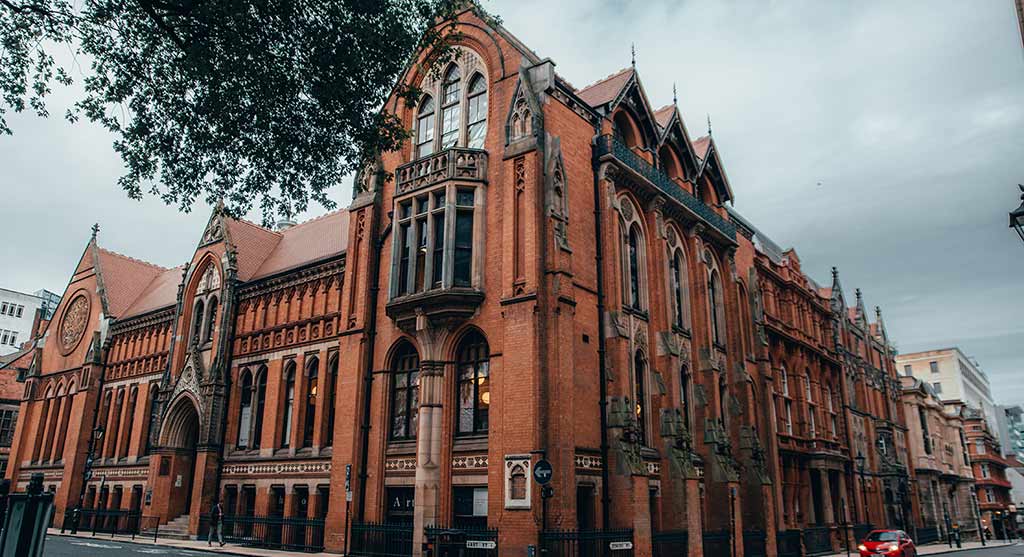
Our Facilities
In 1884 Birmingham Municipal School of Arts and Crafts - the first municipal school in the country, opened at Margaret Street. This building, with its rich history and rare heritage of practice-led knowledge, is home to our BA Art and Design course. The School provides an incredible resource for the production of art and design, and its associated fields of study. The building has a range of facilities available including studios, workshops, specialist art and design library, bookable spaces and lecture/seminar rooms.
Our course is situated within an inclusive physical studio environment. This incubator space has making at it’s heart, it is a place of doing, enabling agility and iteration. The layout is flexible and open plan. Like a laboratory, our space brings together the exploration of art, design and creative digital technologies to allow for the necessary collision and serendipity that innovative ideas creation now requires. The layout is loosely divided into Labs, and equipment within the Labs will be on open display and ready to use. These resources will be in addition to the extensive workshops already available in Margaret Street, that include photography, casting, woodwork, metalwork, silk screen, etching, 3D printing, laser cutting, and printed and constructed textiles.
The specialist library, workshops and studio facilities at the School of Art provide a hub of creative activity for you to immerse yourself within.
Our staff
Jo Newman
Foundation Course Director and BA course leader
Jo chose a career in education so that she could provide students with learning environments where conversations, ideas and materials can be selected, combined, analysed and shared, offering them a way of socializing, caring and questioning to grow their learning with meaning for their futures.
More about JoDr Lara Furniss
BA Art and Design Course Director
Lara has twenty years professional experience working internationally across many art and design disciplines. This extensive cross-disciplinary professional experience directly informs Lara’s teaching, with a primary interest in developing new pedagogic approaches to non-discipline specific problem solving. Lara’s research interests have emerged...
More about Lara










